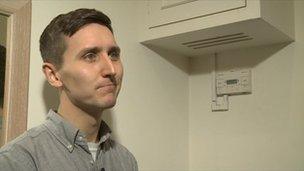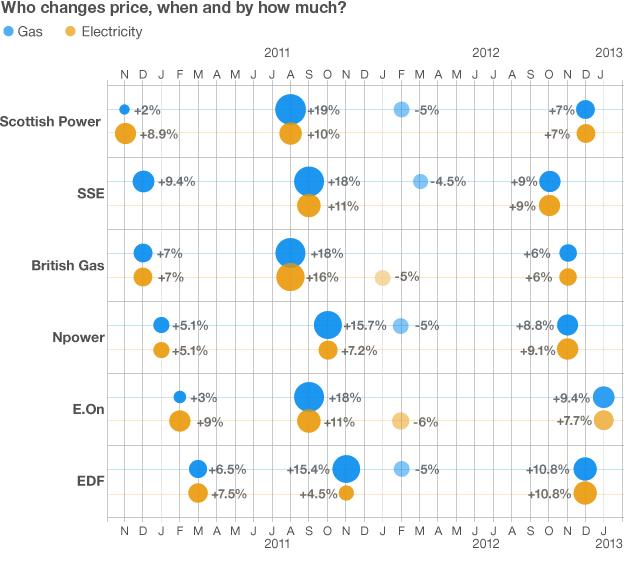How to cut your energy use and save money
- Published

Many houses are still badly insulated, says Greg Shreeve
It is cold out on the streets of Britain at the moment and that means it is tempting to stay at home and turn the thermostat up.
The cost of doing so is still rising fast.
Eon has joined the other major energy providers: SSE, British Gas, Npower, Scottish Power and EDF.
All have now announced big price rises this winter for their customers.
But the Energy Saving Trust reckons that British households are wasting an average of £270 each a year by wasting their heat.
That adds up to an enormous £7.2bn for the country as a whole.
So what does the trust recommend consumers do to cut down on that waste?
"The first place to look is your loft," says Greg Shreeve, a so-called "energy doctor" for the trust.
"As much as a third of all household heat goes out of the roof."
Thicker the better
Even though energy savings experts have recommended for years that people fit loft insulation, the trust says as much as 50% of homes do not have it installed to current standards.
In previous decades smaller amounts of insulation were recommended; sometimes as little as 4in (10cm) of material was layered onto the floors of roof spaces.
Now, energy doctors like Greg Shreeve recommend fitting 11in (27cm) of loft insulation. That is almost as thick as the long side of a sheet of A4 paper.
But it is not just the floor that requires attention.
"The inside of the loft door is also a place people sometimes forget to cover," he says.
"You want to make sure it is much cooler in your loft than it is downstairs. If the insulation is doing a good job of keeping the heat in, you should be able to feel it."
Wasting power
Another spot where insulation is important is a hot water tank.
"Getting a jacket for your tank can be as cheap as £20 and it saves lots of money," Mr Shreeve says.
"If you put your hand on the outside of the jacket it should be cool to the touch keeping all that heat inside."
However there is more to saving money than simply checking on insulation.
"A lot of people know they shouldn't leave electrical goods on standby," says Mr Shreeve.
"Often they don't realise how much power they're wasting that way.
"A typical clock-radio might use three or four watts. That'll cost you around £3 a year," he points out.
Factor in all the appliances on standby in a typical three-bedroom house - from televisions to microwaves with digital clocks to even the speakers on a computer - and the Energy Saving Trust estimate on average £50 to £80 a year gets wasted.
"Lighting and radiators are also key areas," Mr Shreeve says.
"If there is a room in the house you're not using, check to ensure the bulbs are efficient ones and switched off. Radiators should have thermostats on them and be turned down," he advises.
Doing good
The trust has a long list of recommendations on its website which people can follow to try to save as much as possible on their bills.
All this will not just be good for consumers' wallets.
Although the trust's work is designed to help people save pounds, it was originally set up to help the UK meet its international obligations with regards to climate change and carbon dioxide emissions.
So consumers can be mindful that what is good for the pennies in their pockets, is also good for the world at large.
With big energy tariff increases coming into effect, finding simple strategies for consumers to save money is going to be even more important for their pockets in 2013.

- Published10 December 2012
- Published23 November 2012
- Published20 November 2012